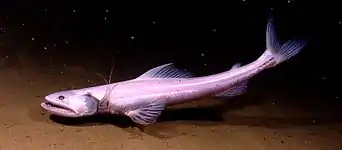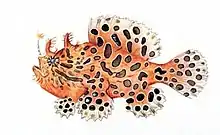| Neoteleostei Temporal range: | |
|---|---|
 | |
| The Neoteleostei include the Aulopiformes or lizardfish. | |
| Scientific classification | |
| Domain: | Eukaryota |
| Kingdom: | Animalia |
| Phylum: | Chordata |
| Class: | Actinopterygii |
| Cohort: | Euteleostei |
| Clade: | Neoteleostei |
The Neoteleostei is a large clade of bony fish mostly consisting of marine clades. Only three lineages have freshwater species: Percopsiformes (Troutperches), which lives exclusively in freshwater,[1] Gadiformes (cods), which is largely marine except from burbot that live in freshwater and a few populations of cod in brackish water,[2][3] and the Percomorpha, which in addition to several marine groups also have many freshwater forms.[4]
The remaining members of Neoteleostei are marine: The populous clade of the Acanthopterygii which consist of the Beryciformes, Holocentridae and the aforementioned Percomorpha (which include families such as the tuna, seahorses, gobies, cichlids, flatfish, wrasse, perches, anglerfish, pufferfish),[5] the Ateleopodidae (jellynoses),[6] the Lampriformes (oarfish, opah, ribbonfish),[7] the Zeiformes (dories),[8] the Polymixiiformes (beardfish),[9] the Stylephorus,[10] the Myctophiformes (lanternfish), and the Aulopiformes (lizardfish) which include some brackwater species (also the marine order Stomiiformes was once included in the Neoteleostei as part of the superorder Stenopterygii, but have since been placed in Stomiati outside the Neoteleostei).[11][12][13][14][15]
The swim bladder, when present, is physoclistous, a trait also shared with the non-neoteleostei orders Argentiniformes and Stomiiformes.[16][17][18][19]
Neoteleostei have also lost the enzymes NOS2 and NOS3, the latter a trait they share with the rest of the Clupeocephala and possibly the Latimeria (NOS2 and NOS3 have also yet to be detected in Elopomorpha).[20][21]
| Neoteleostei |
| |||||||||||||||||||||||||||||||||||||||||||||||||||||||||||||||||||||||||||
| (175mya) |
References
- ↑ Freshwater Fishes, Dispersal Ability, and Nonevidence
- ↑ Chromosome-level genome assembly of burbot (Lota lota) provides insights into the evolutionary adaptations in freshwater
- ↑ Genetic differentiation of brackish water populations of cod Gadus morhua in the southern Baltic, inferred from genotyping using SNP-arrays
- ↑ Reeling in answers to the “freshwater fish paradox”
- ↑ The Diversity of Fishes: Biology, Evolution and Ecology
- ↑ A global assessment of fishes at lower abyssal and upper hadal depths (5000 to 8000 m)
- ↑ Distribution of the Order Lampriformes in the Mediterranean Sea with Notes on Their Biology, Morphology, and Taxonomy
- ↑ Bajaichthys elegans from the Eocene of Bolca (Italy) and the overlooked morphological diversity of Zeiformes (Teleostei, Acanthomorpha)
- ↑ Fishes of the World
- ↑ Deep-sea fish see color in pitch-black darkness
- ↑ Essential Fish Biology: Diversity, Structure and Function
- ↑ Thomas J. Near; et al. (2012). "Resolution of ray-finned fish phylogeny and timing of diversification". PNAS. 109 (34): 13698–13703. Bibcode:2012PNAS..10913698N. doi:10.1073/pnas.1206625109. PMC 3427055. PMID 22869754.
- ↑ Betancur-R, Ricardo; et al. (2013). "The Tree of Life and a New Classification of Bony Fishes". PLOS Currents Tree of Life. 5 (Edition 1). doi:10.1371/currents.tol.53ba26640df0ccaee75bb165c8c26288. PMC 3644299. PMID 23653398.
- ↑ Laurin, M.; Reisz, R.R. (1995). "A reevaluation of early amniote phylogeny". Zoological Journal of the Linnean Society. 113 (2): 165–223. doi:10.1111/j.1096-3642.1995.tb00932.x.
- ↑ Betancur-Rodriguez; et al. (2016). "Phylogenetic Classification of Bony Fishes Version 4". Deepfin. Archived from the original on 11 July 2017. Retrieved 30 December 2016.
- ↑ The Diversity of Fishes: Biology, Evolution and Ecology
- ↑ Polymixiiformes
- ↑ Fishes of the World
- ↑ The Diversity of Fishes
- ↑ Evolution of the nitric oxide synthase family in vertebrates and novel insights in gill development
- ↑ Nitric Oxide Function and Nitric Oxide Synthase Evolution in Aquatic Chordates
